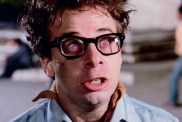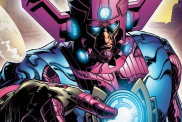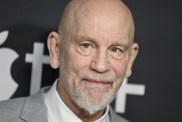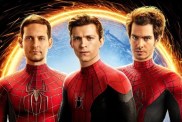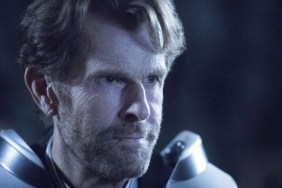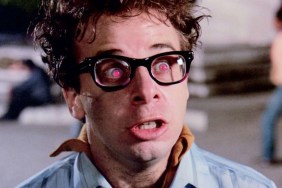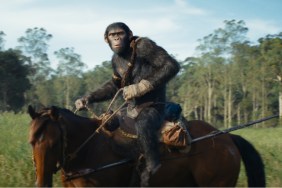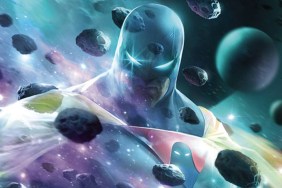Next year, Sony Pictures will bring Marvel’s Ghost Rider to the big screen. The action-thriller stars Nicolas Cage as a motorcycle stuntman named Johnny Blaze who agrees to let his body become host to a vengeful spirit — becoming a bike-riding demon in the process — to secure the safety of his true love, to be played by Eva Mendes. Mark Steven Johnson (Daredevil) wrote and is directing the film, which also stars Wes Bentley, Matt Long, Sam Elliott, Peter Fonda and Donal Logue.
Cage talked to ComingSoon.net/SuperheroHype.com about the anticipated comic book adaptation on the Australian set. Looking very trim with short black hair, Cage wore a rather large cowboy hat during the interview and seemed very excited about his current undertaking of Johnny Blaze.
Q: When we talked to you at the National Treasure junket you weren’t 100 percent sure about this project, whether it was the script or the filmmakers.
Cage: It was always the script. It was always a matter of trying to get the script to a place that I felt comfortable with.
Q: What element did it gain?
Cage: It was mostly different aspects of the effects that I felt were being diminished in earlier drafts and I thought it could be brought up, enhanced so that the movie would be more fun to watch. I just wanted to make sure that they were preserved.
Q: What do you think about the trends of comic book movies?
Cage: Well, I’ve always thought that the comic book film would be wonderfully entertaining for audiences, because it taps into the fantasy world more than just straight up violence. And I had no doubt when the first Batman came out, because of the title and the character, that was going to be a sensational– a very exciting movie to watch, combined with the technology that we have today, that you can take these fantasies that many of us grew up on and really bring them to the big screen. You have marvelous entertainment. Comic books to me are modern mythology, and so it taps into all sorts of psychological and soulful levels for audiences in a positive way, in a fantasy element as opposed to blood and guts, gore fests.
Q: Seems like this is a really CGI heavy movie. How is that working?
Cage: I’ve always enjoyed working with effects. I like any aspect that’s creative, and Kevin Mack, who’s directing the visual effects, is a very creative man and a very interesting person to talk to. So, to me, it’s just stimulating to be around it, to participate. I want to, after the production is finished shooting here, I want to go to where they’re working on the effects and say hello and see what they’re doing with all the painting and how they’re going to make the fire work, because fire is, you probably know, the most difficult of all the digital effects to pull off. Fire and water, but even more so fire.
Q: How have your worked with Mark on developing the character and what input did you have?
Cage: I was concerned that this wasn’t sort of your typical hero. I wanted to approach it from the point of view of someone who is beleaguered by this contract of selling his soul to the devil. So if you were somebody that was experiencing a great deal of pain, like in a dental chair you try to relax by listening to dentist’s music or things like that, so I’m trying to play Johnny Blaze more in that direction than the hard drinking and smoking bad ass. I’m playing him more as someone who, he’s made this deal and he’s trying to avoid confronting it, anything he can do to keep it away from him.
Q: Does the stunt riding play into that?
Cage: Yeah. I think anything like that is a form of escape. Also, the stunt riding keeps him connected to his father, who’s passed away. So there’s a version of being able to keep that relationship going when he’s jumping, because that’s what his father taught him.
Q: How familiar were you with the different iterations of the character and what appealed to you about him specifically?

Cage: The main thing that appealed to me about the character was that it was dealing with very complicated spiritual issues. And for a comic book, that to me seemed different than all the others. I have a line in the movie that we worked on in the movie where I say I’m the only one that can walk in both worlds. And Ghost Rider really is that, when you think about it. Spider-Man doesn’t go into the supernatural or the spiritual world. Superman doesn’t. Batman doesn’t. But Ghost Rider really walks this dimension between two different worlds, and to me that is interesting. I find all that fascinating. I’ve always had an interest in the possibility of ghosts and the possibility of things that are in the unknown that we don’t really comprehend or understand. So that made it more exciting for me. The other idea, that you can take a negative and turn it into a positive. How do you take this terrible mistake of making a deal with the devil and how do you take this curse and turn it into something good? Which, to me is unusual for a comic book based movie. It’s a pretty deep concept. And I was reading it when I was 10 years old. So that’s pretty heavy stuff for kids to be reading.
Q: Ghost Rider can’t exist without violence, so where do you see that element in the film?
Cage: Well, he’s the devil’s bounty hunter. One of his rules is that he will never take a human being’s life. But he will go after demons, other demons, and this movie’s loaded with what they call The Hidden, which are these elemental demons that Mephistopheles, or Black Heart, Mephistopheles’ son, is using, and so the Ghost Rider goes into battle with them more than the people.
Q: How does he battle them?
Cage: He has these wonderful abilities, like hellfire and the chain that he can use and swing, and then he has the penance stare, where you can look at someone and make them review every bad, horrible thing they’ve ever done to anybody and then feel it and feel the pain of all their mistakes and sins and basically reduce you to a human jellyfish.
Q: How is it riding the Hell Cycle?
Cage: I only rode the chopper, Grace. And also the stunt cycle. It’s a Buell. They’re both really terrific. The Hell Cycle, only the Ghost Rider rides that. That’s the other thing. His bike transforms too, and turns into a demon hell cycle. But yeah, that’s not much of a bike to really ride. You have to really know what you’re doing on that. I want to add, though, there is a lot of humor in the movie. We’ve managed to really put a great deal of humor. Just character building humor. There’s the relationship between Johnny Blaze and his best friend, Mack, is an interesting dynamic. Just humor about dealing with the irony of his situation.
Q: How did you prepare physically, mentally or perhaps even spiritually before you took this role?
Cage: Well, I’m not kidding. I was in Africa shooting a movie called Lord of War, and we went to this place in the middle of the desert to shoot for about a week, and — trying to remember what happened exactly, what was the name of the place?– anyway, I don’t remember the exact name. But there weren’t a lot of people there. And I was stuck there and I was driving home in a van, there was a cobra in the road. And I said, Let’s back up; let’s look at it. So we backed it up and the cobra got up like that on its hind, whatever, it doesn’t have legs, but tail, and attacked my car. And I was shocked, and I never got that image out of my head. And then shortly after that, I started eating less portions. I stopped imbibing as much, I didn’t go out as much, didn’t have as many cocktails. And I just kind of worked out a lot more, and got ready for this role. So I think it had something to do with this cobra.
Q: A near death experience?
Cage: Something like that. Or just, he had this look in his eyes like; you got a lot of responsibility don’t blow it. I could take you right now, but I’m here to warn you. Get your sh*t together.
Q: Do you remember what your first exposure to comic books was and do you read any today?
Cage: My first experience with comic books was The Incredible Hulk. And I was living in Long Beach, California. I must have been 7 or 8 and I liked the color of it, the imagination of it. I liked the world that I could escape into. And then I started to read plenty of them and look at them. And Ghost Rider, I had the first one. I remember looking at that as well because it was such a marvelous iconic image, this black leather bike rider with a flaming skull for a head. I didn’t understand what it was about, but I loved the way it looked. So he was an interesting icon for me. Those are my earliest memories.
Q: How is it working with Peter Fonda?
Cage: It’s interesting because when I think of Peter Fonda I think of this 1960s icon. Captain America. But I’ve been doing this for 25 years, and he’s been doing it for 40 years. And it was just odd to me that there’s only a 15 year spread, and yet I see him as this 60s icon. And then I thought, wow, but we’re not that far apart. It’s like, I started to feel thrilled and yeah, thrilled and dated. I felt thrilled and dated.
Q: This might be a semi-personal question. How did it feel to sell your comic book collection?
Cage: Well, I had a bad experience, which, you know; I was– what’s the right thing to say? I was robbed. And they took my best ones. They took Action 1 and Detective 27 and Detective 1. And now today they’re worth who knows what. But I thought to myself, because I’m not the kind of person that wants to take comics and leave them in a safe somewhere. I’d rather put them on the wall and really enjoy them and look at them. But after that happened I thought maybe it’s better not to own them, just to enjoy them from afar, and I sold them.
Q: That must have been tough to do that.
Cage: You know, it was and it wasn’t. I feel like no one really owns anything anyway and it’s time for someone else to enjoy them and have them. Now, obviously, whatever I was doing it wasn’t good enough because they’re missing. So I decided that maybe someone else should have them.

Q: Given how dark the material is, and the fact that you’re trying to interpolate some humor into it, how difficult is it to manage those elements?
Cage: That came naturally to me. I think that heavy material is inherently–I know this is going to sound strange–but it can lend itself very easily to humor. Because I think people, when they’re in heavy occupations, you look at paramedics or cops, they have the blackest humor. But it’s a way of coping with the situation. I guess that’s the only way I can answer that. I’m just thinking about what I said before about being thrilled and dated. Yeah, because I was in the 80s. I was doing Valley Girl, and he was doing Captain America in Easy Rider, so I felt we were both somehow symbolic of a time, of a period, of a time capsule.
Q: Are you signed on for sequels?
Cage: That remains to be seen. I’d have to see the movie and see how it comes together.
Q: Can you say something about Next?
Cage: Lee Tamahori is directing, it’s based on a Philip K. Dick short story called The Golden Man. I play a man who has the gift of pre-vision. He can see what’s going to happen to him very quickly into the future and he’s being chased by the FBI so they can put him up on a TV set and help them find bombs and things like that. And he’s trying to avoid that from happening to him.
Ghost Rider is currently set for release on August 4, 2006.
Source: Andrew Weil
